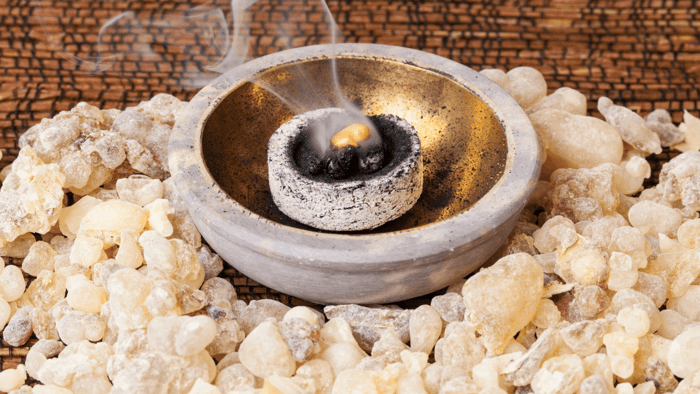Cedarwood for pest control is a great way to avoid annoying bugs. Cedarwood is a popular and diverse group of essential oils, known for their clean scent and incredible pest control properties. Learn about the history and potential of cedarwood, and try our incredible spider-spray to keep out unwanted houseguests!

Botany
Cedarwood essential oil is extracted from the needles, bark, and berries of cedar trees. Our cedarwood oil is produced from Atlas Cedar (Cedrus atlantica), which is native to the Atlas Mountains of Morocco and Algeria. In nature, these cedars provide critical habitat for endangered Barbary macaques.
They are cultivated throughout the temperate regions of the world for ornamental purposes and timber production. Atlas Cedar is more resistant to dry and hot conditions than other conifers, which makes them ideal for many uses.
Cedarwood essential oil can also be extracted from other species of cedar and juniper; the most common are Himalayan cedar (Cedrus deodara), Texas cedar (Juniperus mexicana), and Eastern red cedar (Juniperus virginiana). Each species produces an oil with slightly different qualities, though the main benefits of cedarwood are common to all.

Traditional Medicinal Uses
Historically, the Cedar of Lebanon (Cedrus libani) has produced the oil with the most cultural impact. Cedarwood oil features in many Middle Eastern mythical and religious texts. In the Bible, God instructed Moses to use cedarwood oil as a treatment for leprosy. Cedarwood is commonly used as an anointing oil in Christian, Jewish, and Muslim practices.
Cedarwood oil was an important ingredient in the embalming process of the Ancient Egyptians, who ascribed spiritual significance and preservative properties to the oil.
Meanwhile, Native American and Tibetan tribespeople used the oil of their native cedar trees as a treatment for a variety of ailments, from colds to severe illness.
Today cedarwood oil is used extensively for its fragrance and pesticidal properties in soap, perfumes, household cleaners, and insecticides. Very small quantities of cedarwood EO are used in scientific research as a microscope cleaning oil.

Benefits of Cedarwood Essential Oil
Pest Control
It should be no surprise that bugs don’t like cedarwood oil: cedar closets have a great anti-moth reputation for a reason! Relatively low concentrations of cedarwood oil can effectively repel ants or kill ticks, houseflies and pulse beetles. Additionally, adding cedarwood oil to standing water can kill 98% of mosquito larvae. For an organic, natural pest control “formula,” that’s pretty good!
Calm and Sleep
Cedarwood oil’s calming and sedative properties have been validated by several small lab studies. Diffuse cedarwood essential oil to promote peace and relaxation in your home, leading to happier families and better sleep.
Focus
The fresh scent of cedarwood clears out mental cobwebs and invigorates focus.
Inhibits Microbial Growth
The ancient Egyptians were onto something when they used cedarwood oil as a preservative: modern lab studies have found that cedarwood oil can limit the growth of some microbes, and it is being tested as a potential preserving agent for food packaging films.

How to use
Diffuse cedarwood oil in your living space, office, or bedroom for calm, focus, and better sleep. Try to diffuse as you prepare for work or bed so that the environment is already prepped when you get there. Do not diffuse for more than an hour at a time.
Add a few drops of cedarwood oil to cotton balls and place them in the corners of your closet and near openings to your house to repel bugs. In the summer, add a few drops to standing water sources around your home to beat mosquitoes.
Apply topically in a carrier oil to hydrate and cleanse skin. Rub the oils in and let the mixture sit so that it can act to its full potential.
Warnings
The EPA has stated that cedarwood essential oil is safe for ingestion, diffusion, and pesticidal use. (source)
Always spot-check essential oils before topical application to check for sensitivity and limit diffusing time. Essential oils, although natural, are very potent substances with the potential for unforeseen side effects.

Essential Oil Spider Spray
I love the crisp air of the fall season, but I’m grateful that I have my warm home to go back to. Unfortunately stink bugs, box elder bugs, spiders and Halloween beetles (so named because they seem to knock on our doors every October!) are also glad to have a warm place to spend the chilly season.
Get ahead of the bug invasion by mixing up a spider spray and treating the openings in your house before you’re overrun. I apply this spray around the edges of exterior doors, windows, and any other potential openings I can find. It keeps the bugs away and is safe and non-toxic.
- 10 drops Cedarwood EO
- 5 drops Vetiver EO
- 5 drops Patchouli EO
- 3-4 drops Dishwashing Liquid
- Water
Combine the essential oils and dishwashing liquid in an 8-ounce spray bottle and top off with water so that the bottle is 90% full.
Shake well before every use. Apply to the edges of doors, windows, and other openings to prevent bug entry.




